Business Law Report: English Legal System, Business Types, and Laws
VerifiedAdded on 2023/01/13
|17
|5313
|32
Report
AI Summary
This report provides a detailed overview of the English legal system, exploring its sources of law, the role of government, and the effectiveness of recent reforms. It delves into the different types of businesses, examining their legal formation, management, and funding, along with their respective advantages and disadvantages. The report further investigates legislation, standards, and regulations, analyzing their impact on business operations. It highlights the potential influence of company, employment, and contract law on businesses. The report also includes recommendations based on provided cases, offering a comprehensive understanding of business law principles and their practical application within the UK context. The report covers different business types like unincorporated and incorporated organizations and the methods for dispute resolution.

Business Law
Paraphrase This Document
Need a fresh take? Get an instant paraphrase of this document with our AI Paraphraser
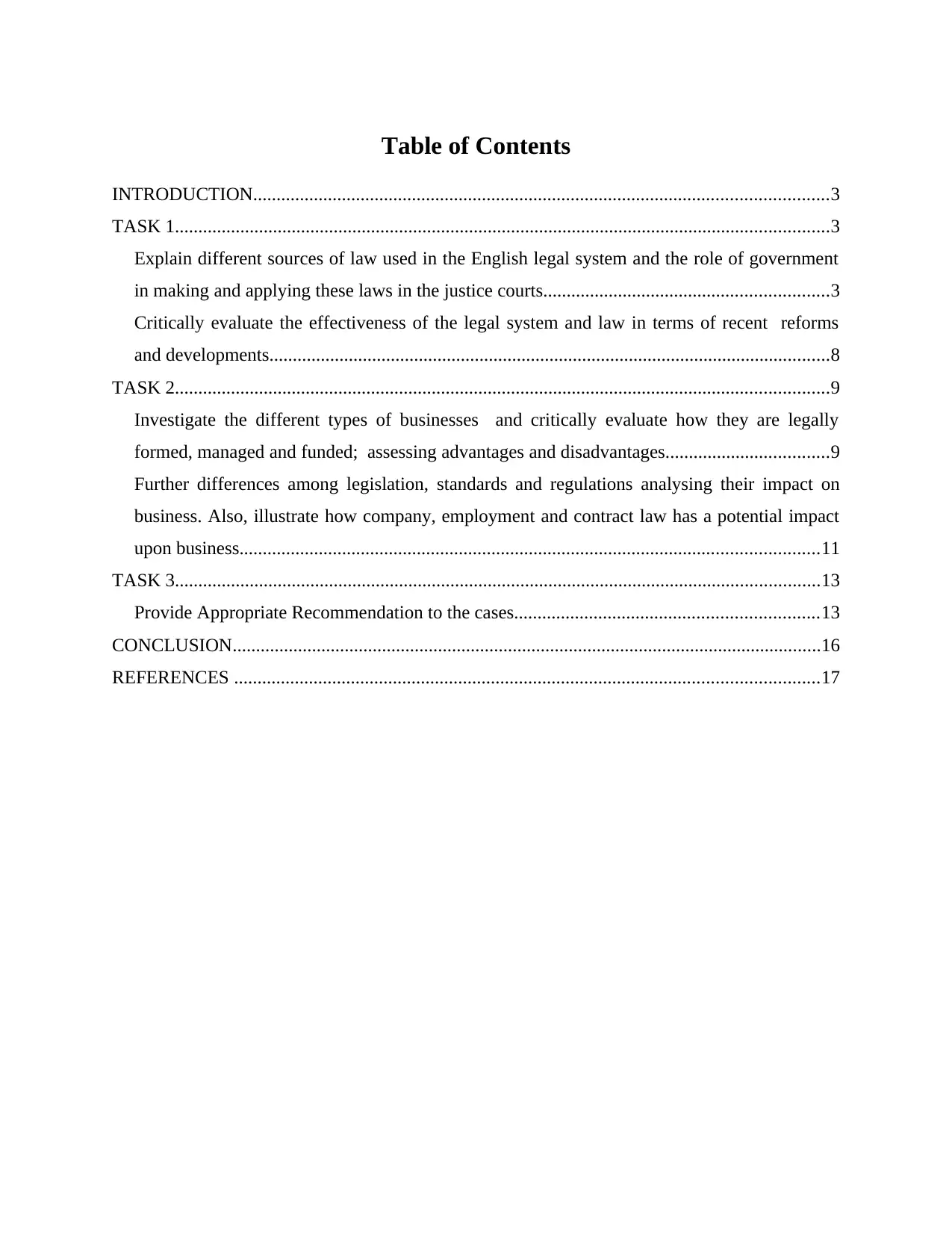
Table of Contents
INTRODUCTION...........................................................................................................................3
TASK 1............................................................................................................................................3
Explain different sources of law used in the English legal system and the role of government
in making and applying these laws in the justice courts.............................................................3
Critically evaluate the effectiveness of the legal system and law in terms of recent reforms
and developments........................................................................................................................8
TASK 2............................................................................................................................................9
Investigate the different types of businesses and critically evaluate how they are legally
formed, managed and funded; assessing advantages and disadvantages...................................9
Further differences among legislation, standards and regulations analysing their impact on
business. Also, illustrate how company, employment and contract law has a potential impact
upon business............................................................................................................................11
TASK 3..........................................................................................................................................13
Provide Appropriate Recommendation to the cases.................................................................13
CONCLUSION..............................................................................................................................16
REFERENCES .............................................................................................................................17
INTRODUCTION...........................................................................................................................3
TASK 1............................................................................................................................................3
Explain different sources of law used in the English legal system and the role of government
in making and applying these laws in the justice courts.............................................................3
Critically evaluate the effectiveness of the legal system and law in terms of recent reforms
and developments........................................................................................................................8
TASK 2............................................................................................................................................9
Investigate the different types of businesses and critically evaluate how they are legally
formed, managed and funded; assessing advantages and disadvantages...................................9
Further differences among legislation, standards and regulations analysing their impact on
business. Also, illustrate how company, employment and contract law has a potential impact
upon business............................................................................................................................11
TASK 3..........................................................................................................................................13
Provide Appropriate Recommendation to the cases.................................................................13
CONCLUSION..............................................................................................................................16
REFERENCES .............................................................................................................................17
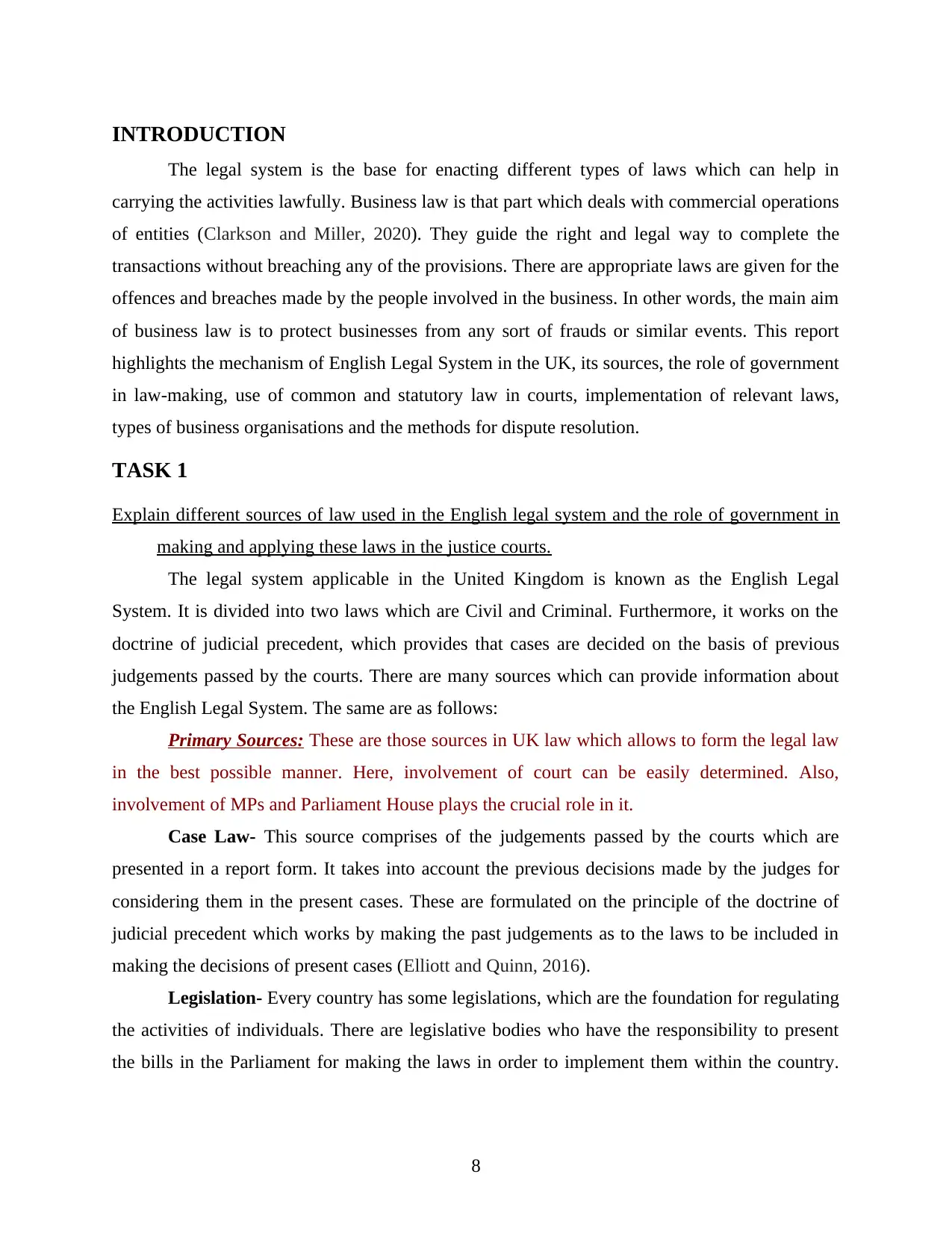
INTRODUCTION
The legal system is the base for enacting different types of laws which can help in
carrying the activities lawfully. Business law is that part which deals with commercial operations
of entities (Clarkson and Miller, 2020). They guide the right and legal way to complete the
transactions without breaching any of the provisions. There are appropriate laws are given for the
offences and breaches made by the people involved in the business. In other words, the main aim
of business law is to protect businesses from any sort of frauds or similar events. This report
highlights the mechanism of English Legal System in the UK, its sources, the role of government
in law-making, use of common and statutory law in courts, implementation of relevant laws,
types of business organisations and the methods for dispute resolution.
TASK 1
Explain different sources of law used in the English legal system and the role of government in
making and applying these laws in the justice courts.
The legal system applicable in the United Kingdom is known as the English Legal
System. It is divided into two laws which are Civil and Criminal. Furthermore, it works on the
doctrine of judicial precedent, which provides that cases are decided on the basis of previous
judgements passed by the courts. There are many sources which can provide information about
the English Legal System. The same are as follows:
Primary Sources: These are those sources in UK law which allows to form the legal law
in the best possible manner. Here, involvement of court can be easily determined. Also,
involvement of MPs and Parliament House plays the crucial role in it.
Case Law- This source comprises of the judgements passed by the courts which are
presented in a report form. It takes into account the previous decisions made by the judges for
considering them in the present cases. These are formulated on the principle of the doctrine of
judicial precedent which works by making the past judgements as to the laws to be included in
making the decisions of present cases (Elliott and Quinn, 2016).
Legislation- Every country has some legislations, which are the foundation for regulating
the activities of individuals. There are legislative bodies who have the responsibility to present
the bills in the Parliament for making the laws in order to implement them within the country.
8
The legal system is the base for enacting different types of laws which can help in
carrying the activities lawfully. Business law is that part which deals with commercial operations
of entities (Clarkson and Miller, 2020). They guide the right and legal way to complete the
transactions without breaching any of the provisions. There are appropriate laws are given for the
offences and breaches made by the people involved in the business. In other words, the main aim
of business law is to protect businesses from any sort of frauds or similar events. This report
highlights the mechanism of English Legal System in the UK, its sources, the role of government
in law-making, use of common and statutory law in courts, implementation of relevant laws,
types of business organisations and the methods for dispute resolution.
TASK 1
Explain different sources of law used in the English legal system and the role of government in
making and applying these laws in the justice courts.
The legal system applicable in the United Kingdom is known as the English Legal
System. It is divided into two laws which are Civil and Criminal. Furthermore, it works on the
doctrine of judicial precedent, which provides that cases are decided on the basis of previous
judgements passed by the courts. There are many sources which can provide information about
the English Legal System. The same are as follows:
Primary Sources: These are those sources in UK law which allows to form the legal law
in the best possible manner. Here, involvement of court can be easily determined. Also,
involvement of MPs and Parliament House plays the crucial role in it.
Case Law- This source comprises of the judgements passed by the courts which are
presented in a report form. It takes into account the previous decisions made by the judges for
considering them in the present cases. These are formulated on the principle of the doctrine of
judicial precedent which works by making the past judgements as to the laws to be included in
making the decisions of present cases (Elliott and Quinn, 2016).
Legislation- Every country has some legislations, which are the foundation for regulating
the activities of individuals. There are legislative bodies who have the responsibility to present
the bills in the Parliament for making the laws in order to implement them within the country.
8
⊘ This is a preview!⊘
Do you want full access?
Subscribe today to unlock all pages.

Trusted by 1+ million students worldwide
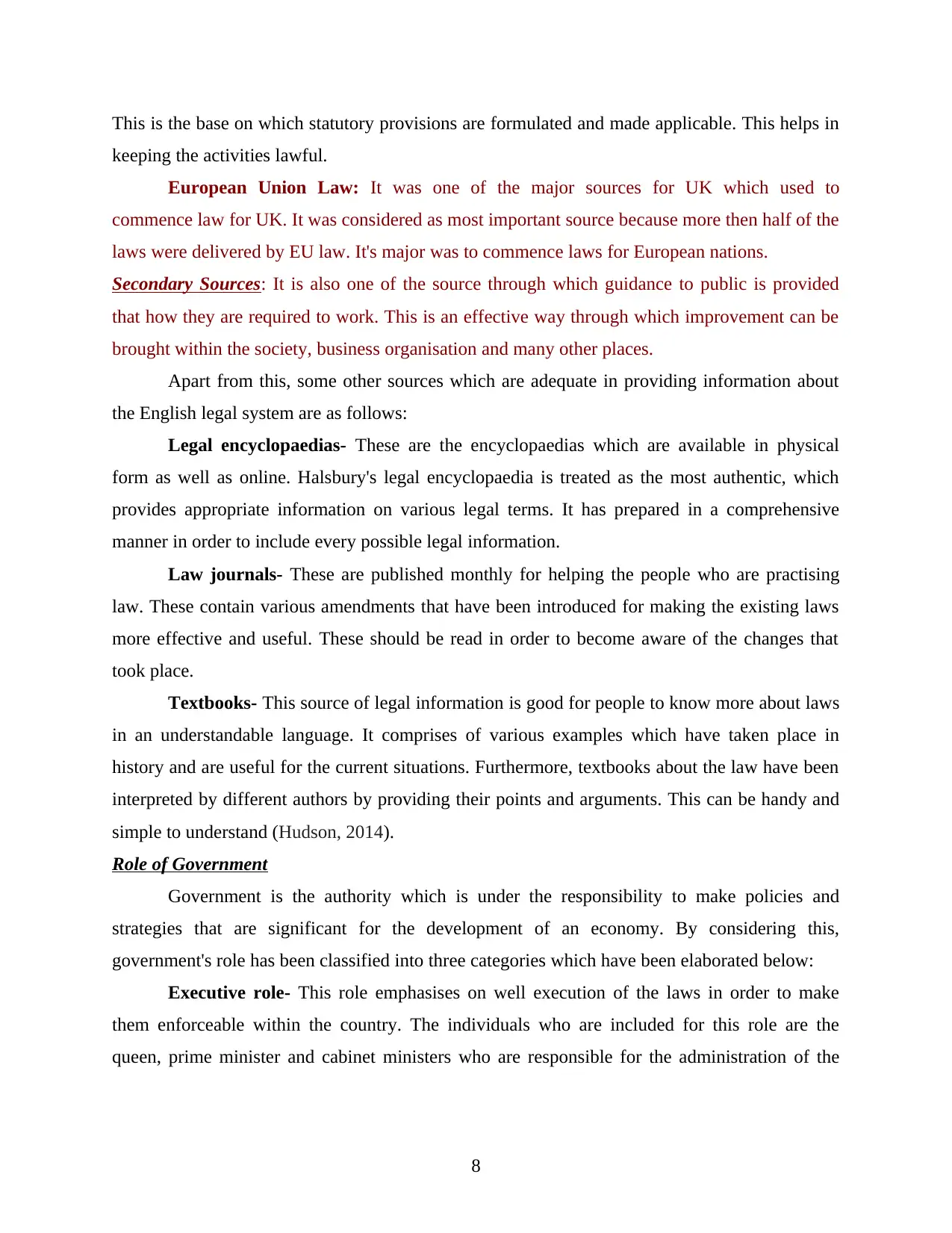
This is the base on which statutory provisions are formulated and made applicable. This helps in
keeping the activities lawful.
European Union Law: It was one of the major sources for UK which used to
commence law for UK. It was considered as most important source because more then half of the
laws were delivered by EU law. It's major was to commence laws for European nations.
Secondary Sources: It is also one of the source through which guidance to public is provided
that how they are required to work. This is an effective way through which improvement can be
brought within the society, business organisation and many other places.
Apart from this, some other sources which are adequate in providing information about
the English legal system are as follows:
Legal encyclopaedias- These are the encyclopaedias which are available in physical
form as well as online. Halsbury's legal encyclopaedia is treated as the most authentic, which
provides appropriate information on various legal terms. It has prepared in a comprehensive
manner in order to include every possible legal information.
Law journals- These are published monthly for helping the people who are practising
law. These contain various amendments that have been introduced for making the existing laws
more effective and useful. These should be read in order to become aware of the changes that
took place.
Textbooks- This source of legal information is good for people to know more about laws
in an understandable language. It comprises of various examples which have taken place in
history and are useful for the current situations. Furthermore, textbooks about the law have been
interpreted by different authors by providing their points and arguments. This can be handy and
simple to understand (Hudson, 2014).
Role of Government
Government is the authority which is under the responsibility to make policies and
strategies that are significant for the development of an economy. By considering this,
government's role has been classified into three categories which have been elaborated below:
Executive role- This role emphasises on well execution of the laws in order to make
them enforceable within the country. The individuals who are included for this role are the
queen, prime minister and cabinet ministers who are responsible for the administration of the
8
keeping the activities lawful.
European Union Law: It was one of the major sources for UK which used to
commence law for UK. It was considered as most important source because more then half of the
laws were delivered by EU law. It's major was to commence laws for European nations.
Secondary Sources: It is also one of the source through which guidance to public is provided
that how they are required to work. This is an effective way through which improvement can be
brought within the society, business organisation and many other places.
Apart from this, some other sources which are adequate in providing information about
the English legal system are as follows:
Legal encyclopaedias- These are the encyclopaedias which are available in physical
form as well as online. Halsbury's legal encyclopaedia is treated as the most authentic, which
provides appropriate information on various legal terms. It has prepared in a comprehensive
manner in order to include every possible legal information.
Law journals- These are published monthly for helping the people who are practising
law. These contain various amendments that have been introduced for making the existing laws
more effective and useful. These should be read in order to become aware of the changes that
took place.
Textbooks- This source of legal information is good for people to know more about laws
in an understandable language. It comprises of various examples which have taken place in
history and are useful for the current situations. Furthermore, textbooks about the law have been
interpreted by different authors by providing their points and arguments. This can be handy and
simple to understand (Hudson, 2014).
Role of Government
Government is the authority which is under the responsibility to make policies and
strategies that are significant for the development of an economy. By considering this,
government's role has been classified into three categories which have been elaborated below:
Executive role- This role emphasises on well execution of the laws in order to make
them enforceable within the country. The individuals who are included for this role are the
queen, prime minister and cabinet ministers who are responsible for the administration of the
8
Paraphrase This Document
Need a fresh take? Get an instant paraphrase of this document with our AI Paraphraser
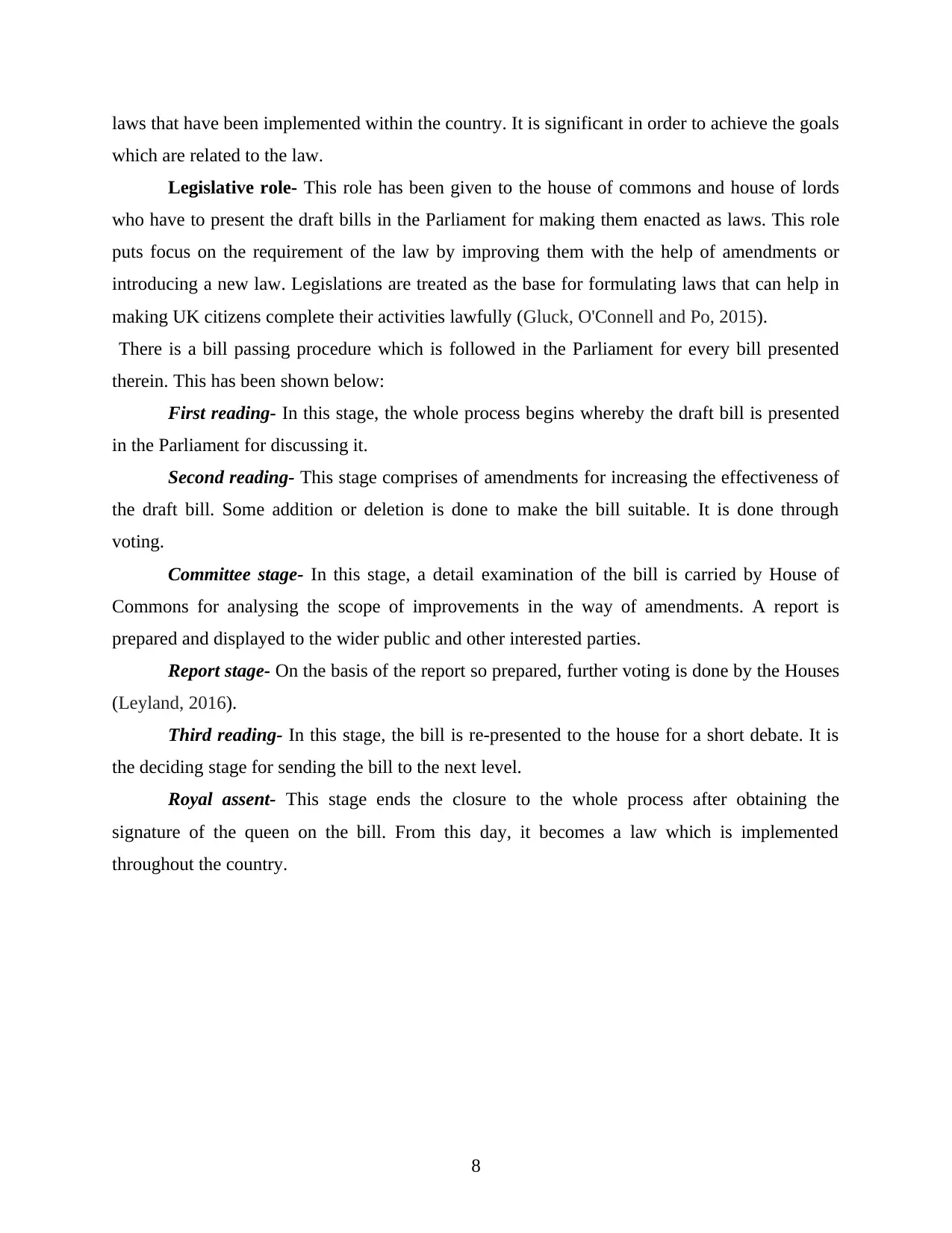
laws that have been implemented within the country. It is significant in order to achieve the goals
which are related to the law.
Legislative role- This role has been given to the house of commons and house of lords
who have to present the draft bills in the Parliament for making them enacted as laws. This role
puts focus on the requirement of the law by improving them with the help of amendments or
introducing a new law. Legislations are treated as the base for formulating laws that can help in
making UK citizens complete their activities lawfully (Gluck, O'Connell and Po, 2015).
There is a bill passing procedure which is followed in the Parliament for every bill presented
therein. This has been shown below:
First reading- In this stage, the whole process begins whereby the draft bill is presented
in the Parliament for discussing it.
Second reading- This stage comprises of amendments for increasing the effectiveness of
the draft bill. Some addition or deletion is done to make the bill suitable. It is done through
voting.
Committee stage- In this stage, a detail examination of the bill is carried by House of
Commons for analysing the scope of improvements in the way of amendments. A report is
prepared and displayed to the wider public and other interested parties.
Report stage- On the basis of the report so prepared, further voting is done by the Houses
(Leyland, 2016).
Third reading- In this stage, the bill is re-presented to the house for a short debate. It is
the deciding stage for sending the bill to the next level.
Royal assent- This stage ends the closure to the whole process after obtaining the
signature of the queen on the bill. From this day, it becomes a law which is implemented
throughout the country.
8
which are related to the law.
Legislative role- This role has been given to the house of commons and house of lords
who have to present the draft bills in the Parliament for making them enacted as laws. This role
puts focus on the requirement of the law by improving them with the help of amendments or
introducing a new law. Legislations are treated as the base for formulating laws that can help in
making UK citizens complete their activities lawfully (Gluck, O'Connell and Po, 2015).
There is a bill passing procedure which is followed in the Parliament for every bill presented
therein. This has been shown below:
First reading- In this stage, the whole process begins whereby the draft bill is presented
in the Parliament for discussing it.
Second reading- This stage comprises of amendments for increasing the effectiveness of
the draft bill. Some addition or deletion is done to make the bill suitable. It is done through
voting.
Committee stage- In this stage, a detail examination of the bill is carried by House of
Commons for analysing the scope of improvements in the way of amendments. A report is
prepared and displayed to the wider public and other interested parties.
Report stage- On the basis of the report so prepared, further voting is done by the Houses
(Leyland, 2016).
Third reading- In this stage, the bill is re-presented to the house for a short debate. It is
the deciding stage for sending the bill to the next level.
Royal assent- This stage ends the closure to the whole process after obtaining the
signature of the queen on the bill. From this day, it becomes a law which is implemented
throughout the country.
8

8
⊘ This is a preview!⊘
Do you want full access?
Subscribe today to unlock all pages.

Trusted by 1+ million students worldwide
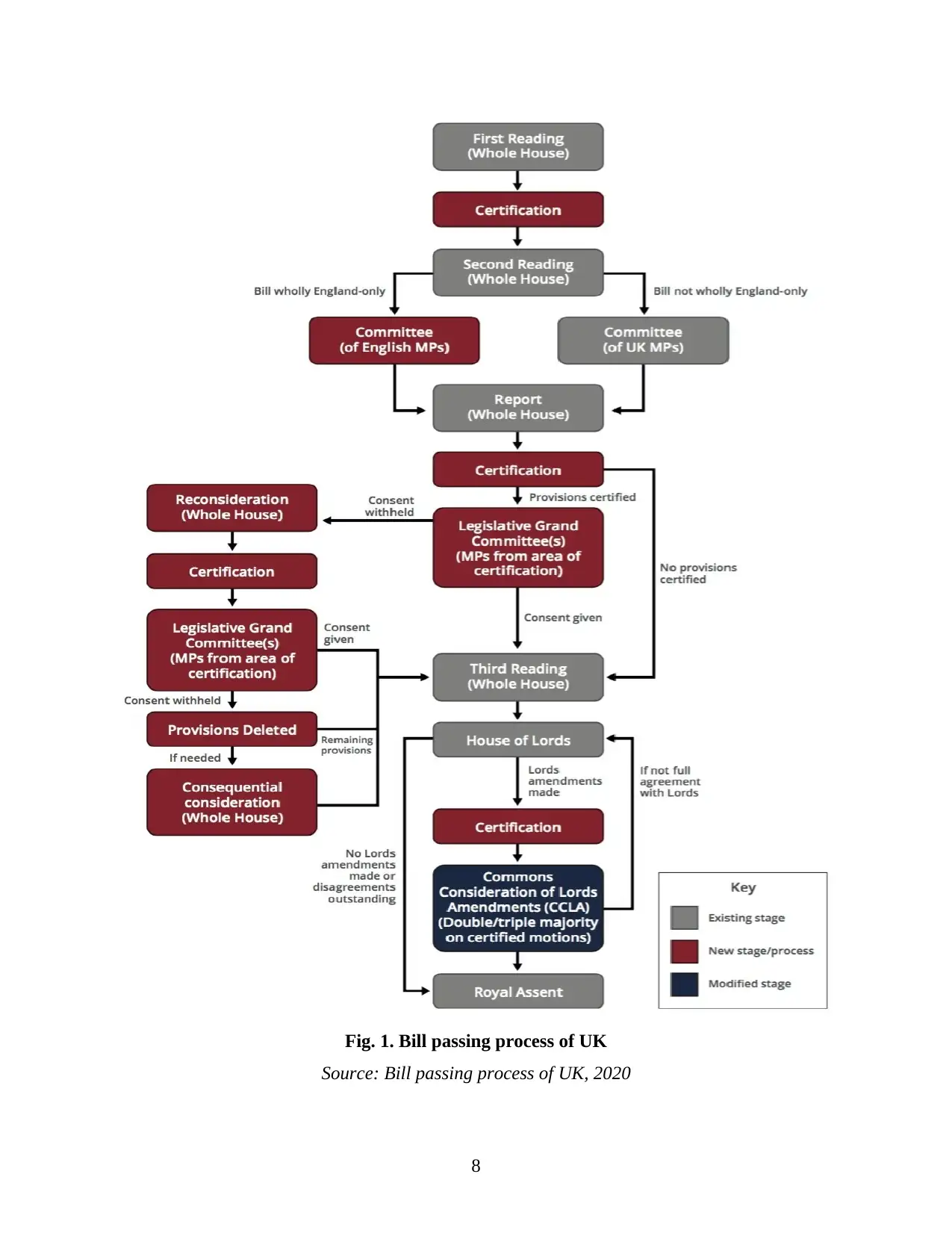
Fig. 1. Bill passing process of UK
Source: Bill passing process of UK, 2020
8
Source: Bill passing process of UK, 2020
8
Paraphrase This Document
Need a fresh take? Get an instant paraphrase of this document with our AI Paraphraser
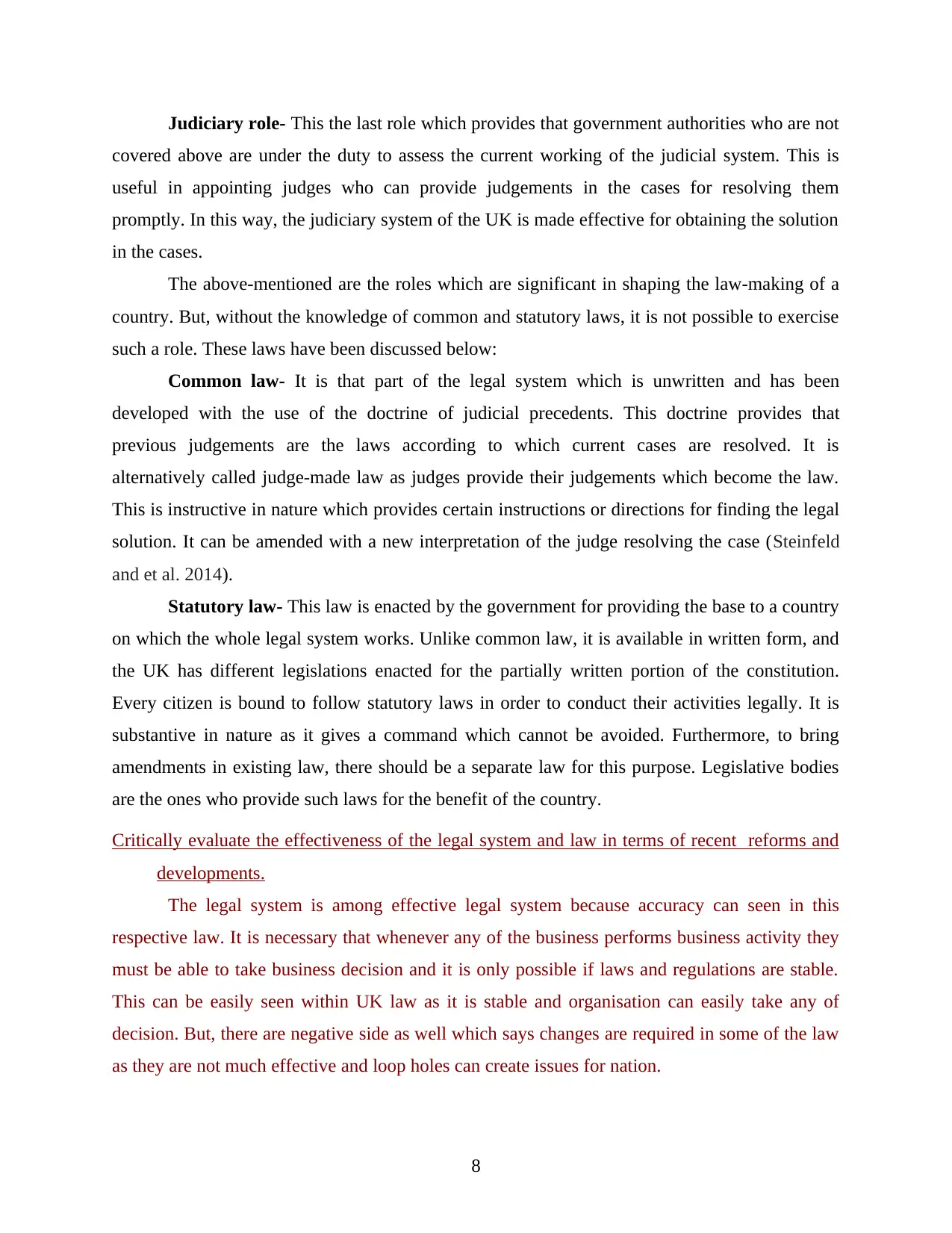
Judiciary role- This the last role which provides that government authorities who are not
covered above are under the duty to assess the current working of the judicial system. This is
useful in appointing judges who can provide judgements in the cases for resolving them
promptly. In this way, the judiciary system of the UK is made effective for obtaining the solution
in the cases.
The above-mentioned are the roles which are significant in shaping the law-making of a
country. But, without the knowledge of common and statutory laws, it is not possible to exercise
such a role. These laws have been discussed below:
Common law- It is that part of the legal system which is unwritten and has been
developed with the use of the doctrine of judicial precedents. This doctrine provides that
previous judgements are the laws according to which current cases are resolved. It is
alternatively called judge-made law as judges provide their judgements which become the law.
This is instructive in nature which provides certain instructions or directions for finding the legal
solution. It can be amended with a new interpretation of the judge resolving the case (Steinfeld
and et al. 2014).
Statutory law- This law is enacted by the government for providing the base to a country
on which the whole legal system works. Unlike common law, it is available in written form, and
the UK has different legislations enacted for the partially written portion of the constitution.
Every citizen is bound to follow statutory laws in order to conduct their activities legally. It is
substantive in nature as it gives a command which cannot be avoided. Furthermore, to bring
amendments in existing law, there should be a separate law for this purpose. Legislative bodies
are the ones who provide such laws for the benefit of the country.
Critically evaluate the effectiveness of the legal system and law in terms of recent reforms and
developments.
The legal system is among effective legal system because accuracy can seen in this
respective law. It is necessary that whenever any of the business performs business activity they
must be able to take business decision and it is only possible if laws and regulations are stable.
This can be easily seen within UK law as it is stable and organisation can easily take any of
decision. But, there are negative side as well which says changes are required in some of the law
as they are not much effective and loop holes can create issues for nation.
8
covered above are under the duty to assess the current working of the judicial system. This is
useful in appointing judges who can provide judgements in the cases for resolving them
promptly. In this way, the judiciary system of the UK is made effective for obtaining the solution
in the cases.
The above-mentioned are the roles which are significant in shaping the law-making of a
country. But, without the knowledge of common and statutory laws, it is not possible to exercise
such a role. These laws have been discussed below:
Common law- It is that part of the legal system which is unwritten and has been
developed with the use of the doctrine of judicial precedents. This doctrine provides that
previous judgements are the laws according to which current cases are resolved. It is
alternatively called judge-made law as judges provide their judgements which become the law.
This is instructive in nature which provides certain instructions or directions for finding the legal
solution. It can be amended with a new interpretation of the judge resolving the case (Steinfeld
and et al. 2014).
Statutory law- This law is enacted by the government for providing the base to a country
on which the whole legal system works. Unlike common law, it is available in written form, and
the UK has different legislations enacted for the partially written portion of the constitution.
Every citizen is bound to follow statutory laws in order to conduct their activities legally. It is
substantive in nature as it gives a command which cannot be avoided. Furthermore, to bring
amendments in existing law, there should be a separate law for this purpose. Legislative bodies
are the ones who provide such laws for the benefit of the country.
Critically evaluate the effectiveness of the legal system and law in terms of recent reforms and
developments.
The legal system is among effective legal system because accuracy can seen in this
respective law. It is necessary that whenever any of the business performs business activity they
must be able to take business decision and it is only possible if laws and regulations are stable.
This can be easily seen within UK law as it is stable and organisation can easily take any of
decision. But, there are negative side as well which says changes are required in some of the law
as they are not much effective and loop holes can create issues for nation.
8
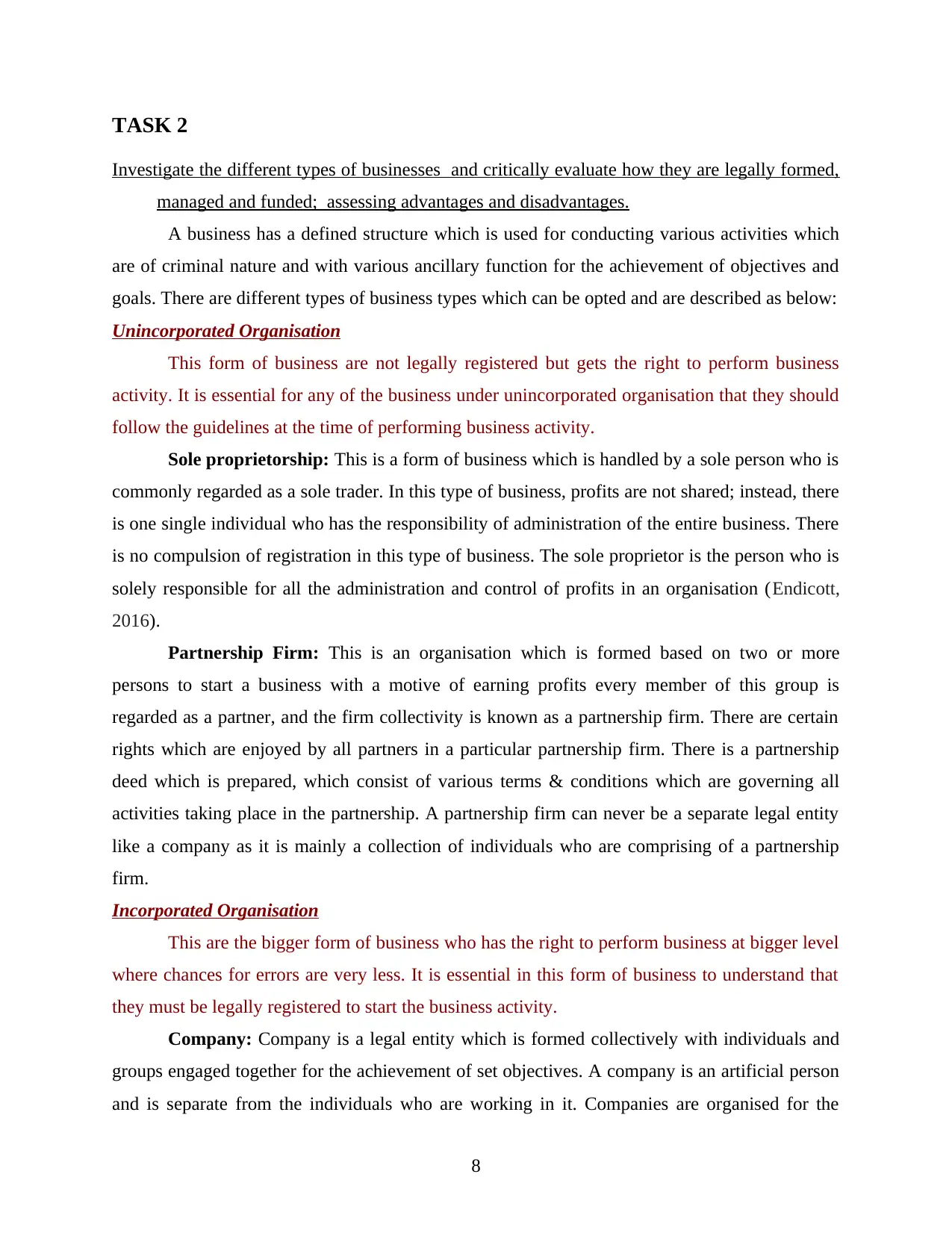
TASK 2
Investigate the different types of businesses and critically evaluate how they are legally formed,
managed and funded; assessing advantages and disadvantages.
A business has a defined structure which is used for conducting various activities which
are of criminal nature and with various ancillary function for the achievement of objectives and
goals. There are different types of business types which can be opted and are described as below:
Unincorporated Organisation
This form of business are not legally registered but gets the right to perform business
activity. It is essential for any of the business under unincorporated organisation that they should
follow the guidelines at the time of performing business activity.
Sole proprietorship: This is a form of business which is handled by a sole person who is
commonly regarded as a sole trader. In this type of business, profits are not shared; instead, there
is one single individual who has the responsibility of administration of the entire business. There
is no compulsion of registration in this type of business. The sole proprietor is the person who is
solely responsible for all the administration and control of profits in an organisation (Endicott,
2016).
Partnership Firm: This is an organisation which is formed based on two or more
persons to start a business with a motive of earning profits every member of this group is
regarded as a partner, and the firm collectivity is known as a partnership firm. There are certain
rights which are enjoyed by all partners in a particular partnership firm. There is a partnership
deed which is prepared, which consist of various terms & conditions which are governing all
activities taking place in the partnership. A partnership firm can never be a separate legal entity
like a company as it is mainly a collection of individuals who are comprising of a partnership
firm.
Incorporated Organisation
This are the bigger form of business who has the right to perform business at bigger level
where chances for errors are very less. It is essential in this form of business to understand that
they must be legally registered to start the business activity.
Company: Company is a legal entity which is formed collectively with individuals and
groups engaged together for the achievement of set objectives. A company is an artificial person
and is separate from the individuals who are working in it. Companies are organised for the
8
Investigate the different types of businesses and critically evaluate how they are legally formed,
managed and funded; assessing advantages and disadvantages.
A business has a defined structure which is used for conducting various activities which
are of criminal nature and with various ancillary function for the achievement of objectives and
goals. There are different types of business types which can be opted and are described as below:
Unincorporated Organisation
This form of business are not legally registered but gets the right to perform business
activity. It is essential for any of the business under unincorporated organisation that they should
follow the guidelines at the time of performing business activity.
Sole proprietorship: This is a form of business which is handled by a sole person who is
commonly regarded as a sole trader. In this type of business, profits are not shared; instead, there
is one single individual who has the responsibility of administration of the entire business. There
is no compulsion of registration in this type of business. The sole proprietor is the person who is
solely responsible for all the administration and control of profits in an organisation (Endicott,
2016).
Partnership Firm: This is an organisation which is formed based on two or more
persons to start a business with a motive of earning profits every member of this group is
regarded as a partner, and the firm collectivity is known as a partnership firm. There are certain
rights which are enjoyed by all partners in a particular partnership firm. There is a partnership
deed which is prepared, which consist of various terms & conditions which are governing all
activities taking place in the partnership. A partnership firm can never be a separate legal entity
like a company as it is mainly a collection of individuals who are comprising of a partnership
firm.
Incorporated Organisation
This are the bigger form of business who has the right to perform business at bigger level
where chances for errors are very less. It is essential in this form of business to understand that
they must be legally registered to start the business activity.
Company: Company is a legal entity which is formed collectively with individuals and
groups engaged together for the achievement of set objectives. A company is an artificial person
and is separate from the individuals who are working in it. Companies are organised for the
8
⊘ This is a preview!⊘
Do you want full access?
Subscribe today to unlock all pages.

Trusted by 1+ million students worldwide
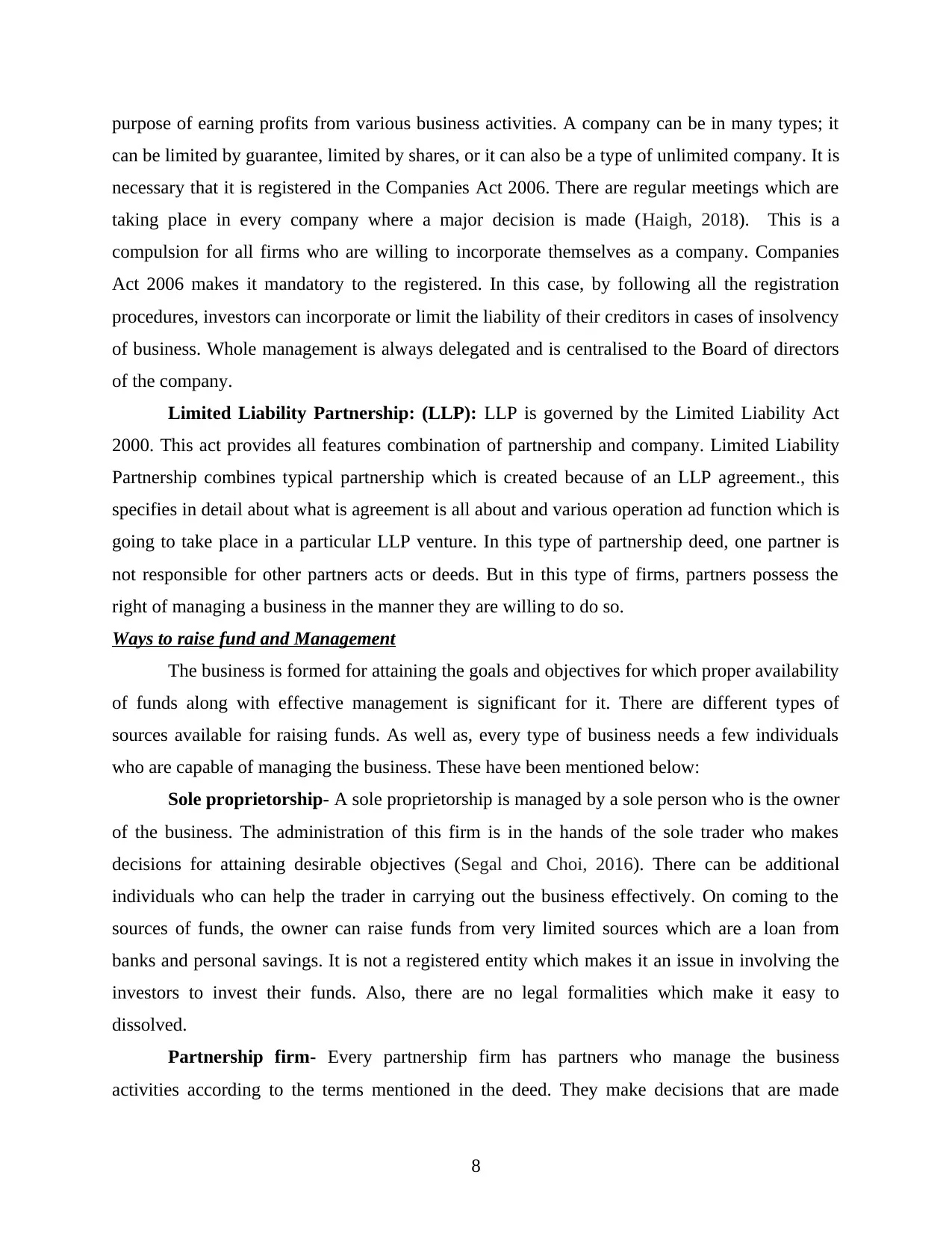
purpose of earning profits from various business activities. A company can be in many types; it
can be limited by guarantee, limited by shares, or it can also be a type of unlimited company. It is
necessary that it is registered in the Companies Act 2006. There are regular meetings which are
taking place in every company where a major decision is made (Haigh, 2018). This is a
compulsion for all firms who are willing to incorporate themselves as a company. Companies
Act 2006 makes it mandatory to the registered. In this case, by following all the registration
procedures, investors can incorporate or limit the liability of their creditors in cases of insolvency
of business. Whole management is always delegated and is centralised to the Board of directors
of the company.
Limited Liability Partnership: (LLP): LLP is governed by the Limited Liability Act
2000. This act provides all features combination of partnership and company. Limited Liability
Partnership combines typical partnership which is created because of an LLP agreement., this
specifies in detail about what is agreement is all about and various operation ad function which is
going to take place in a particular LLP venture. In this type of partnership deed, one partner is
not responsible for other partners acts or deeds. But in this type of firms, partners possess the
right of managing a business in the manner they are willing to do so.
Ways to raise fund and Management
The business is formed for attaining the goals and objectives for which proper availability
of funds along with effective management is significant for it. There are different types of
sources available for raising funds. As well as, every type of business needs a few individuals
who are capable of managing the business. These have been mentioned below:
Sole proprietorship- A sole proprietorship is managed by a sole person who is the owner
of the business. The administration of this firm is in the hands of the sole trader who makes
decisions for attaining desirable objectives (Segal and Choi, 2016). There can be additional
individuals who can help the trader in carrying out the business effectively. On coming to the
sources of funds, the owner can raise funds from very limited sources which are a loan from
banks and personal savings. It is not a registered entity which makes it an issue in involving the
investors to invest their funds. Also, there are no legal formalities which make it easy to
dissolved.
Partnership firm- Every partnership firm has partners who manage the business
activities according to the terms mentioned in the deed. They make decisions that are made
8
can be limited by guarantee, limited by shares, or it can also be a type of unlimited company. It is
necessary that it is registered in the Companies Act 2006. There are regular meetings which are
taking place in every company where a major decision is made (Haigh, 2018). This is a
compulsion for all firms who are willing to incorporate themselves as a company. Companies
Act 2006 makes it mandatory to the registered. In this case, by following all the registration
procedures, investors can incorporate or limit the liability of their creditors in cases of insolvency
of business. Whole management is always delegated and is centralised to the Board of directors
of the company.
Limited Liability Partnership: (LLP): LLP is governed by the Limited Liability Act
2000. This act provides all features combination of partnership and company. Limited Liability
Partnership combines typical partnership which is created because of an LLP agreement., this
specifies in detail about what is agreement is all about and various operation ad function which is
going to take place in a particular LLP venture. In this type of partnership deed, one partner is
not responsible for other partners acts or deeds. But in this type of firms, partners possess the
right of managing a business in the manner they are willing to do so.
Ways to raise fund and Management
The business is formed for attaining the goals and objectives for which proper availability
of funds along with effective management is significant for it. There are different types of
sources available for raising funds. As well as, every type of business needs a few individuals
who are capable of managing the business. These have been mentioned below:
Sole proprietorship- A sole proprietorship is managed by a sole person who is the owner
of the business. The administration of this firm is in the hands of the sole trader who makes
decisions for attaining desirable objectives (Segal and Choi, 2016). There can be additional
individuals who can help the trader in carrying out the business effectively. On coming to the
sources of funds, the owner can raise funds from very limited sources which are a loan from
banks and personal savings. It is not a registered entity which makes it an issue in involving the
investors to invest their funds. Also, there are no legal formalities which make it easy to
dissolved.
Partnership firm- Every partnership firm has partners who manage the business
activities according to the terms mentioned in the deed. They make decisions that are made
8
Paraphrase This Document
Need a fresh take? Get an instant paraphrase of this document with our AI Paraphraser
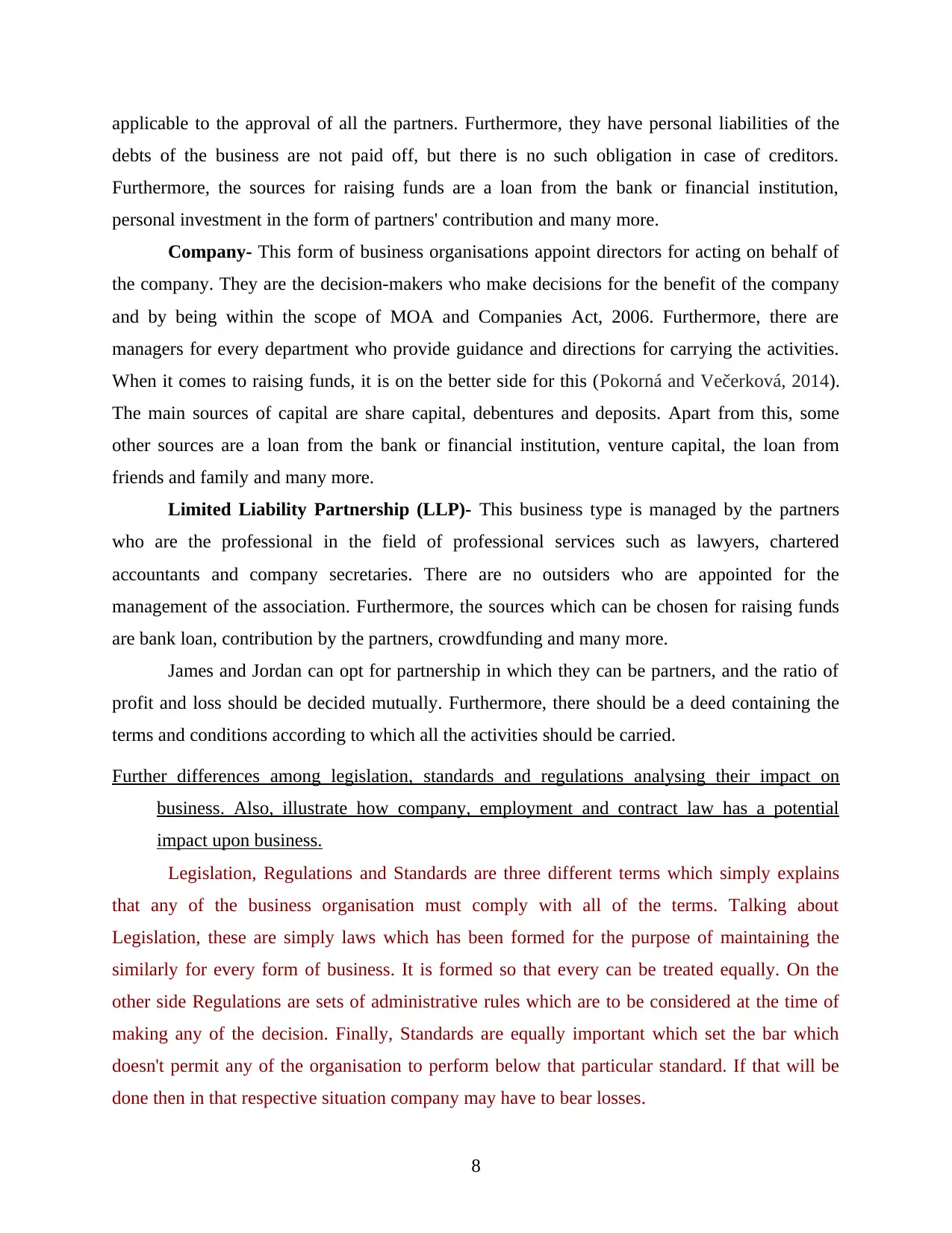
applicable to the approval of all the partners. Furthermore, they have personal liabilities of the
debts of the business are not paid off, but there is no such obligation in case of creditors.
Furthermore, the sources for raising funds are a loan from the bank or financial institution,
personal investment in the form of partners' contribution and many more.
Company- This form of business organisations appoint directors for acting on behalf of
the company. They are the decision-makers who make decisions for the benefit of the company
and by being within the scope of MOA and Companies Act, 2006. Furthermore, there are
managers for every department who provide guidance and directions for carrying the activities.
When it comes to raising funds, it is on the better side for this (Pokorná and Večerková, 2014).
The main sources of capital are share capital, debentures and deposits. Apart from this, some
other sources are a loan from the bank or financial institution, venture capital, the loan from
friends and family and many more.
Limited Liability Partnership (LLP)- This business type is managed by the partners
who are the professional in the field of professional services such as lawyers, chartered
accountants and company secretaries. There are no outsiders who are appointed for the
management of the association. Furthermore, the sources which can be chosen for raising funds
are bank loan, contribution by the partners, crowdfunding and many more.
James and Jordan can opt for partnership in which they can be partners, and the ratio of
profit and loss should be decided mutually. Furthermore, there should be a deed containing the
terms and conditions according to which all the activities should be carried.
Further differences among legislation, standards and regulations analysing their impact on
business. Also, illustrate how company, employment and contract law has a potential
impact upon business.
Legislation, Regulations and Standards are three different terms which simply explains
that any of the business organisation must comply with all of the terms. Talking about
Legislation, these are simply laws which has been formed for the purpose of maintaining the
similarly for every form of business. It is formed so that every can be treated equally. On the
other side Regulations are sets of administrative rules which are to be considered at the time of
making any of the decision. Finally, Standards are equally important which set the bar which
doesn't permit any of the organisation to perform below that particular standard. If that will be
done then in that respective situation company may have to bear losses.
8
debts of the business are not paid off, but there is no such obligation in case of creditors.
Furthermore, the sources for raising funds are a loan from the bank or financial institution,
personal investment in the form of partners' contribution and many more.
Company- This form of business organisations appoint directors for acting on behalf of
the company. They are the decision-makers who make decisions for the benefit of the company
and by being within the scope of MOA and Companies Act, 2006. Furthermore, there are
managers for every department who provide guidance and directions for carrying the activities.
When it comes to raising funds, it is on the better side for this (Pokorná and Večerková, 2014).
The main sources of capital are share capital, debentures and deposits. Apart from this, some
other sources are a loan from the bank or financial institution, venture capital, the loan from
friends and family and many more.
Limited Liability Partnership (LLP)- This business type is managed by the partners
who are the professional in the field of professional services such as lawyers, chartered
accountants and company secretaries. There are no outsiders who are appointed for the
management of the association. Furthermore, the sources which can be chosen for raising funds
are bank loan, contribution by the partners, crowdfunding and many more.
James and Jordan can opt for partnership in which they can be partners, and the ratio of
profit and loss should be decided mutually. Furthermore, there should be a deed containing the
terms and conditions according to which all the activities should be carried.
Further differences among legislation, standards and regulations analysing their impact on
business. Also, illustrate how company, employment and contract law has a potential
impact upon business.
Legislation, Regulations and Standards are three different terms which simply explains
that any of the business organisation must comply with all of the terms. Talking about
Legislation, these are simply laws which has been formed for the purpose of maintaining the
similarly for every form of business. It is formed so that every can be treated equally. On the
other side Regulations are sets of administrative rules which are to be considered at the time of
making any of the decision. Finally, Standards are equally important which set the bar which
doesn't permit any of the organisation to perform below that particular standard. If that will be
done then in that respective situation company may have to bear losses.
8
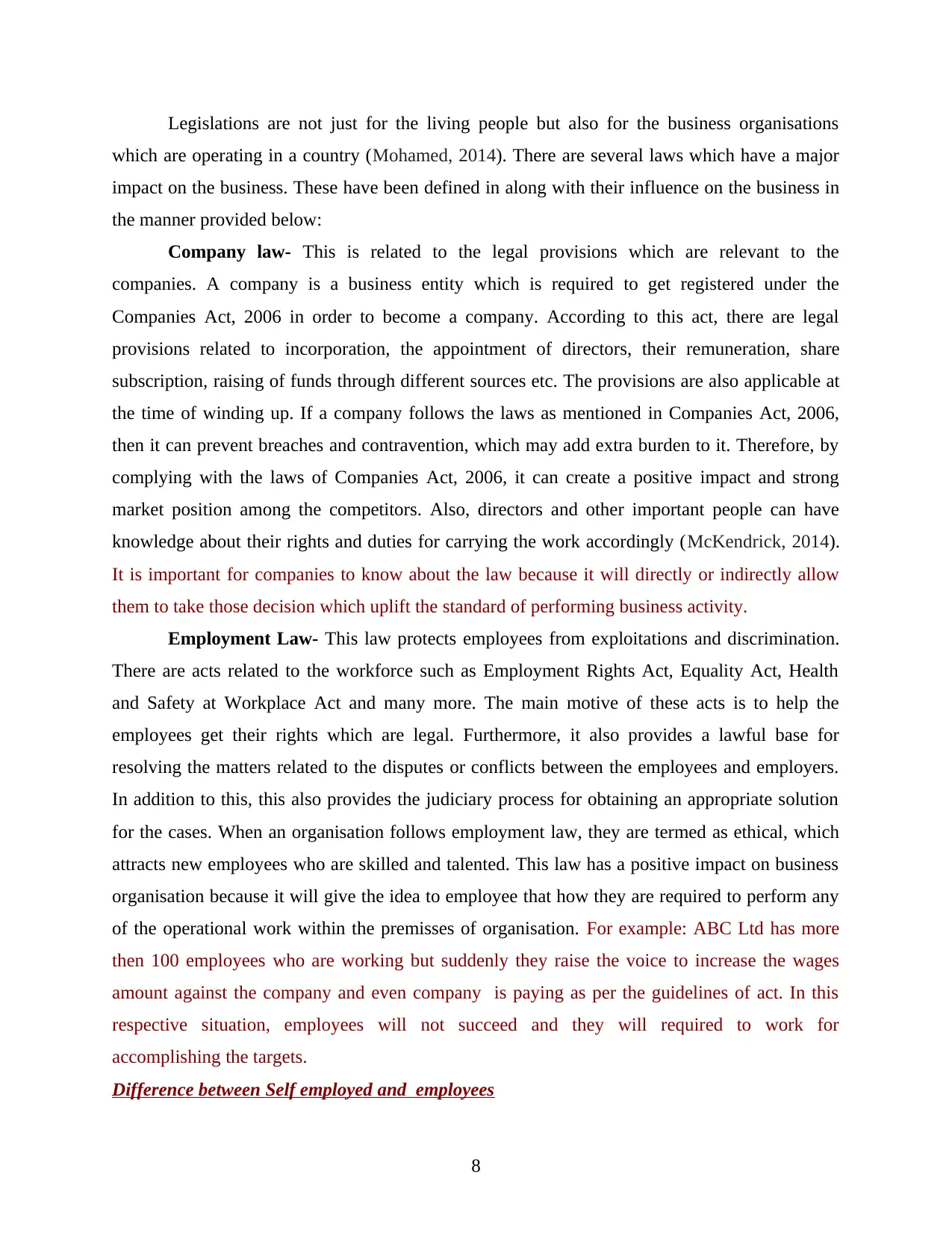
Legislations are not just for the living people but also for the business organisations
which are operating in a country (Mohamed, 2014). There are several laws which have a major
impact on the business. These have been defined in along with their influence on the business in
the manner provided below:
Company law- This is related to the legal provisions which are relevant to the
companies. A company is a business entity which is required to get registered under the
Companies Act, 2006 in order to become a company. According to this act, there are legal
provisions related to incorporation, the appointment of directors, their remuneration, share
subscription, raising of funds through different sources etc. The provisions are also applicable at
the time of winding up. If a company follows the laws as mentioned in Companies Act, 2006,
then it can prevent breaches and contravention, which may add extra burden to it. Therefore, by
complying with the laws of Companies Act, 2006, it can create a positive impact and strong
market position among the competitors. Also, directors and other important people can have
knowledge about their rights and duties for carrying the work accordingly (McKendrick, 2014).
It is important for companies to know about the law because it will directly or indirectly allow
them to take those decision which uplift the standard of performing business activity.
Employment Law- This law protects employees from exploitations and discrimination.
There are acts related to the workforce such as Employment Rights Act, Equality Act, Health
and Safety at Workplace Act and many more. The main motive of these acts is to help the
employees get their rights which are legal. Furthermore, it also provides a lawful base for
resolving the matters related to the disputes or conflicts between the employees and employers.
In addition to this, this also provides the judiciary process for obtaining an appropriate solution
for the cases. When an organisation follows employment law, they are termed as ethical, which
attracts new employees who are skilled and talented. This law has a positive impact on business
organisation because it will give the idea to employee that how they are required to perform any
of the operational work within the premisses of organisation. For example: ABC Ltd has more
then 100 employees who are working but suddenly they raise the voice to increase the wages
amount against the company and even company is paying as per the guidelines of act. In this
respective situation, employees will not succeed and they will required to work for
accomplishing the targets.
Difference between Self employed and employees
8
which are operating in a country (Mohamed, 2014). There are several laws which have a major
impact on the business. These have been defined in along with their influence on the business in
the manner provided below:
Company law- This is related to the legal provisions which are relevant to the
companies. A company is a business entity which is required to get registered under the
Companies Act, 2006 in order to become a company. According to this act, there are legal
provisions related to incorporation, the appointment of directors, their remuneration, share
subscription, raising of funds through different sources etc. The provisions are also applicable at
the time of winding up. If a company follows the laws as mentioned in Companies Act, 2006,
then it can prevent breaches and contravention, which may add extra burden to it. Therefore, by
complying with the laws of Companies Act, 2006, it can create a positive impact and strong
market position among the competitors. Also, directors and other important people can have
knowledge about their rights and duties for carrying the work accordingly (McKendrick, 2014).
It is important for companies to know about the law because it will directly or indirectly allow
them to take those decision which uplift the standard of performing business activity.
Employment Law- This law protects employees from exploitations and discrimination.
There are acts related to the workforce such as Employment Rights Act, Equality Act, Health
and Safety at Workplace Act and many more. The main motive of these acts is to help the
employees get their rights which are legal. Furthermore, it also provides a lawful base for
resolving the matters related to the disputes or conflicts between the employees and employers.
In addition to this, this also provides the judiciary process for obtaining an appropriate solution
for the cases. When an organisation follows employment law, they are termed as ethical, which
attracts new employees who are skilled and talented. This law has a positive impact on business
organisation because it will give the idea to employee that how they are required to perform any
of the operational work within the premisses of organisation. For example: ABC Ltd has more
then 100 employees who are working but suddenly they raise the voice to increase the wages
amount against the company and even company is paying as per the guidelines of act. In this
respective situation, employees will not succeed and they will required to work for
accomplishing the targets.
Difference between Self employed and employees
8
⊘ This is a preview!⊘
Do you want full access?
Subscribe today to unlock all pages.

Trusted by 1+ million students worldwide
1 out of 17
Related Documents
Your All-in-One AI-Powered Toolkit for Academic Success.
+13062052269
info@desklib.com
Available 24*7 on WhatsApp / Email
![[object Object]](/_next/static/media/star-bottom.7253800d.svg)
Unlock your academic potential
Copyright © 2020–2026 A2Z Services. All Rights Reserved. Developed and managed by ZUCOL.





